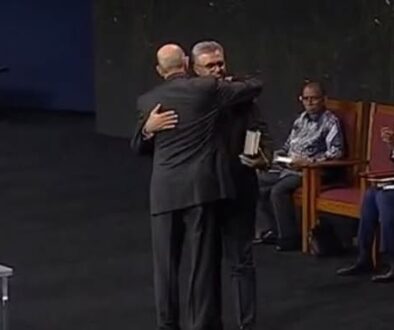Leader of the Adventist Church in Equatorial Guinea Expelled by the National Government
by Adventist Today News Team
Pastor Manuel García-Cáceres, president of the Seventh-day Adventist Church in Equatorial Guinea, has been arrested and deported from the small nation on the west coast of Africa. His deportation was announced in a news bulletin released on Friday (June 7) by the Adventist Review. He was arrested on May 22 and forced to leave the country the next day.
A missionary from Spain, Garcia-Caceres has been president of the Equatorial Guinea Mission for about a year. He left the nation without being able to say goodbye to his wife and daughter, both of whom were waiting to return to Spain for a reunion with García, according to the bulletin on Friday.
García-Caceres was summoned to the nation’s Justice Ministry on May 21 and accused of bringing "special equipment for satellite communications” into the country. He was alleged to have to equipment “to report outside of the country ‘internal information’ of Equatorial Guinea.” Officials accused García-Caceres of having equipment that could elude Guinean security services detection, and thus was deemed “a danger to national security.”
Someone had informed authorities that legally-imported FM broadcasting equipment was the allegedly illegal “satellite equipment.” Police then searched the pastor’s home and office, finding only one piece of electronics. “The single object they found similar to what the detractors described was a radio FM transmitter, donated by the Adventist church in Villajoyosa, in Spain’s Alicante province,” it was reported. “The FM radio equipment was correctly reported at customs when imported from Spain.” At the time of the police search, the gear had not been unpacked or used in the country.
The next day, May 22, García-Caceres was again summoned to the Justice Ministry, and this time ordered to pay a fine of one million Central African Francs or approximately $2,000. Despite paying the fine, authorities jailed the pastor that day. On May 23, Spain’s ambassador to Equatorial Guinea visited García-Caceres in prison and that evening he was taken to the airport in Malabo, with his passport returned to him once the plane took off.
The events illustrate the dangers still confronting missionary workers in some parts of the world, said John Graz, director of public affairs and religious liberty for the General Conference. “The deportation of Pastor Manuel García-Cáceres after 13 months of good service for his church and for the people of Equatorial Guinea, shows how fragile religious freedom and the rule of law are in some parts of the world,” Graz told the Adventist Review. “Missionaries who bring their knowledge and expertise for the good of people are [sometimes] subject to the will of political authorities, without any regards for the ministry they give, or for the international protection of human rights.”
The first Seventh-day Adventist missionaries arrived in Equatorial Guinea in 1960. The work was interrupted by the political situation in 1972, but resumed two years later, according to the Seventh-day Adventist Encyclopedia. As of 2011, there are 19 Seventh-day Adventist churches and 2,453 baptized members in the nation.
Equatorial Guinea has one of the worst human rights records in the world, consistently ranking among the "worst of the worst" in Freedom House's annual survey of political and civil rights. Reporters Without Borders ranks President Teodoro Obiang Nguema Mbasogo among its "predators" of press freedom. The US Trafficking in Persons Report, 2012, states "Equatorial Guinea is a source and destination for women and children subjected to forced labor and sex trafficking." The report rates Equatorial Guinea as a "Tier 3" country, the lowest (worst) ranking: "Countries whose governments do not fully comply with the minimum standards and are not making significant efforts to do so."
Equatorial Guinea, one of Africa’s poorest and smallest nations, was a colony of Spain until 1968. The first elected president became a dictator, created a single-party state and presided over a reign of terror in which a third of the population was killed or fled. He committed genocide, closed down churches and presided over the economy's collapse. A coup d'état in 1979 deposed Macias Nguema and he was executed.
The constitution of Equatorial Guinea, written with help from the United Nations in 1982, gives current President Teodoro Obiang extensive powers, including the right to make laws by decree, dissolve the elected parliament, and serve as commander in chief of the armed forces. Under Obiang, the basic infrastructure of Equatorial Guinea has improved, with more than 80 percent of the roads paved and ports and airports being built. However, when a British parliamentary group toured the country as guests of the president in 2011, The Guardian newspaper reported that very few of Equatorial Guinea's citizens seem to be benefiting from improvements. The Obiang regime is an ally of the United States. During a recent UN General Assembly, he urged the U.S. to strengthen cooperation in Africa. U.S. President Barack Obama posed for an official photograph with President Obiang.
There are nearly 3,000 Adventist adherents among a population of about 700,000 in Equatorial Guinea. There are 19 local churches and only three credentialed clergy, with no schools or health institutions. There has been an exceptional growth rate among Adventists in recent years, averaging nearly five percent each year.



